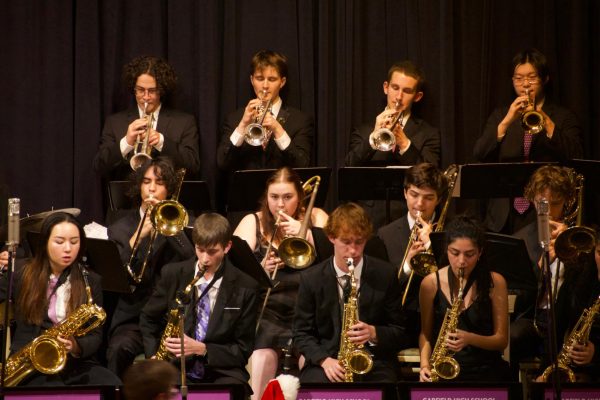How to Get a Free Fireman Suit
Navigating the SPS Skills Center
Do you ever spend your first period with your eyes half-open and a small droplet of drool dangling from your mouth? Do you ever look out the window and wish you weren’t learning for the thousandth time how to construct a thesis? Does the thought occasionally pass through your mind that school might be a waste of your time? Shockingly enough, these things do happen to students, including senior Hank Halfaker.
Halfaker has known for awhile that his future occupation wouldn’t necessarily require the tools one gains in high school, tools such as the quadratic formula or MLA formatting.
“I want to be a fireman; I see my purpose on this earth is to help people,” said senior Hank Halfaker.
He also added that his desire to join fire services stemmed from the job security attached with being a fireman: “People are never going to stop being stupid [and start fires].”
Upon arriving at his junior year meeting with Mr. Lee last spring, Halfaker found a way to get out of the high school doldrums; the Garfield counselor instructed Halfaker to pursue his firefighting dreams through the Skills Center.
Now what is the Skills Centers, you may ask?
“Skill centers are courses where students during the regular year take very advanced career and technical educational courses…in fields that we have determined can create a career after high school,” said the principal of the Seattle Public School’s Skills Center, Dan Golosman.
Thirteen programs make up the Skills Center, and each provides an intensive level of education in certain professional fields, which range from aerospace science to multimedia broadcasting to culinary arts. Participating students are enrolled in daily, 2.5-hour-long classes taught by professionals, and can earn career and technical education credits through Skill Center classes. The opportunity for getting cross-credits is also available, which allow students to get other credits, like math or science, in one course.
The programs are currently located at several different district schools, and while Garfield is not one of them, Golosman assures that transportation shouldn’t be an issue: “We have transportation going to and from locations…we make sure that you have a bus or a cab to get to the class and back to your home school.”
But the best part about the program is that they are all free, with the exception of a few small lab fees.
In Halfaker’s case, he has been gifted with a full-body fireman suit, after registering for and starting the Fire Science Skill Center this fall semester.
Essentially, students enrolled in a Skill Center spend half of their day doing what they love, and the other half going to school for only a few standard classes.
“It’s the only class I’ve taken in high school that actually feels worth it…I genuinely enjoy getting up everyday,” said Halfaker.
This senior’s weekly schedule consists of four days in his classroom at Rainier Beach, where Halfaker studies from firefighting and EMT textbooks with the two other upperclassmen in the program. The small class size allows Halfaker and his peers to get plenty of attention and high-quality learning from one of the six instructors, who all have been active firemen for at least a decade.
On Mondays, Halfaker gets to have a little more fun at the joint training facility in West Seattle.
“[The facility] is used by fire, police and public services. We go there and do everything that someone in Drill School would do for getting on the fire services. This Monday, we learned how to tap a fire hydrant, attack a fire with a hose, and set up a supply line,” he said.
Halfaker’s favorite moment in the Skill Center so far has also been in this facility.
“They have something they call a confidence course, which is this maze through the walls…it’s super narrow and you can’t see anything, plus there’s wires draped all throughout it to snag you up. You enter through a trap door and have to brush your way through without freaking out,” he explained.
Participating in a Skill Center doesn’t necessarily guarantee a career, but it certainly gives students an advantage for their future. Golosman said that completing a Skill Center program often allows students to begin working right out of high school.
“In some programs, you are handed a certificate at the end of the class…you’re literally holding a document in your hand that says ‘I can do this job after high school’.” He added that the Skill Center gives students immediate connections into industries: “Some kids [who participated in the aerospace program] have been hired straight out of high school and into aerospace companies like Boeing …and after one year of working, Boeing puts in money in case they want to go to college.”
Overall, Halfaker highly recommends that students utilize the Skills Center.
“They actually prepare you for the real world, outside of high school and college.”
Visit http://skillscenter.seattleschools.org to find a skill you may be interested in learning or for more information.
Hank Halfaker Quotes
The skill center is a series of classes that you can take that are a little more real-world based, and so they actually kind of prepare you for the real world, outside of high school and college
Not all occupations that need a college education
They find a place on a seattle public school campus-his is at rainier beach
In my junior meeting Mr. Lee asked what I wanted to be when I grew up, and I said I wanted to be a fireman (I would hate myself if i had a 9-5 desk job) I see my purpose on this earth to help people. What better way to help people than to save people. Also I would get a fair amount of job security, cause people are never going to stop being stupid.
Filled out an application (pretty easy), submitted it. Anyone can join, three periods of the day. Difficult for non-seniors schedule room.
My class has three people, but FITE has classes in Bellevue and Tacoma that have been running for many years and have 30+ people in the classes
Ours started two years ago
On mondays, we go to the joint training facility, which is for fire, police and public services. In west Seattle. We will go there and do everything that someone in Drill School would do for getting on the fire services. On Monday, we learned how to tap a fire hydrant, attack a fire with a hose, and how to set up a supply line
Tuesday, thursday, friday we are in a classroom at Rainier Beach where we work through a textbook (EMT and firefighting), same one as in Drill School. On these days its all hands on
Has tests and grades
Going through this process doesn’t necessarily guarantee you anything….45% percent of those who go through the program get hired on…this is a really high rate. It gives you a foot in the door. I have six instructors, all current firefighters (for 10+ years), so all of a sudden you know a bunch of people in the fire service
Does it in the morning
My coolest memory so far is at the joint-training facility, where they have something they call a “confidence course”, where they have this maze through the walls..it’s super narrow and you can’t see anything, plus there’s wires draped all throughout it to snag you up. You enter through a trap door and have to brush your way through without freaking out.
It’s the only class I’ve taken in high school that actually feels worth it…I genuinely enjoy getting up everyday because I get to go do this thing. I’d definitely recommend it
Everyone gets bunker gear, which is used firefighting outfits
Dan Golosman Quotes
Washington state has skill centers all over
Skill centers are places where students during the regular year take very advanced career and technical educational courses…in fields that we have determined can create a career after high school
Just because they are taking these courses, it doesn’t mean the kids aren’t going to college
Kids can use these skills to get a really high-paying summer job…
Some kids have been hired straight out of high school into aerospace companies like boeing and get paid a lot, “and after one year boeing puts in money in case they want to go to college”
The skill center opens up opportunities and options…You will meet industry professionals, either they will come to your class and speak…we do a lot of things like field trips, we try to set up internships or apprenticeships to help kids get experience and connections in that industry with specific employers, so those employers know you
You are handed a certificate at the end of the class, so you’re literally holding a certificate in your hand that says ‘I can do this job after high school’
Students earn career and technical education credits for classes, and we also have classes which offer cross-credits” which allow students to get two credits in one, like getting a math or science credit
All of our courses are free, a couple of courses have a few small lab fees
Paper and online applications so it’s accessible to those who may not have computers
13 programs in seven sites, “we would make sure that you have a bus or a cab to get to the class and back to your home school” has transportation going to and from
Not any programs at garfield right now
Summer school is a great opportunity for students to get up on their credits, and also just to explore careers that they may not have otherwise have time to explore
half-day classes, free courses
The most important thing is that we want to make sure that families know about these opportunities…because many families don’t know
Hope to be offering more in the future




